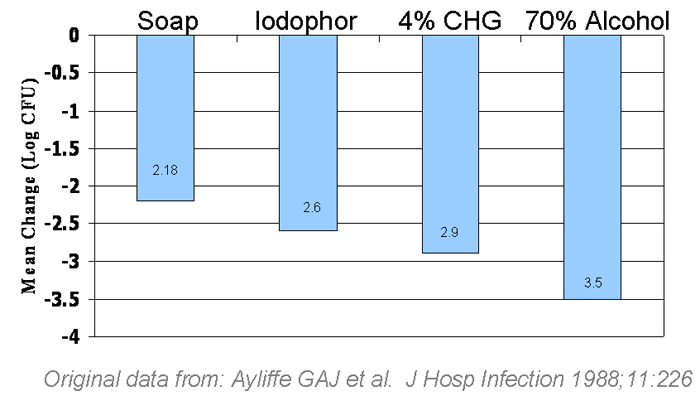Alcohol-based Handrubs
Alcohol-based handrub is the hand hygiene product of choice
Alcohol-based handrub is the gold standard of care for hand hygiene practice in healthcare settings, whereas handwashing is reserved for situations when hands are visibly soiled, or when gloves have not been worn in the care of a patient with C. difficile.
Alcohol-based handrub is the hand hygiene product of choice for all standard aseptic procedures. Surgical scrub is required for surgical procedures. For definitions on standard vs. surgical aseptic technique see Section 3.6.1 of the 2019 Australian Guidelines for the Prevention and Control of Infections in Healthcare.
Alcohol-based handrub is also the recommended product for the prevention of intravascular catheter related infections.
Alcohol-based handrubs should be used (when hands are visibly clean) instead of handwashing because they:
- Substantially reduce bacterial count on hands
- Require less time than handwashing
- Are more accessible
- Are self-drying
- Are gentler on skin and cause less skin irritation and dryness than frequent soap and water washes, since all handrubs contain skin emollient (moisturisers)
Since 2002 use of alcohol-based handrubs has been the recommended product for hand hygiene in healthcare settings. Hand washing should be reserved for situations when hands are visibly soiled.
Alcohol-based handrubs have excellent antimicrobial activity against Gram positive and Gram negative vegetative bacteria, and good antimicrobial activity against enveloped viruses. Alcohol solutions containing 60-80% alcohol are most effective. It has been well established that alcohols effectively reduce the bacterial counts on hands better than soap and water (1).
Alcohol-based handrubs are more effective against most bacteria and many viruses than either medicated or non-medicated soaps (see Figure 1 below).
Figure 1: Effectiveness of different HH products in reducing bacterial counts after 30 sec. use.

References:
World Health Organisation. WHO Guidelines on Hand Hygiene in Health Care. In: World Alliance for Patient Safety, editor. First Global Patient Safety Challenge Clean Care is Safer Care. 1 ed. Geneva: World Health Organisation Press; 2009.
